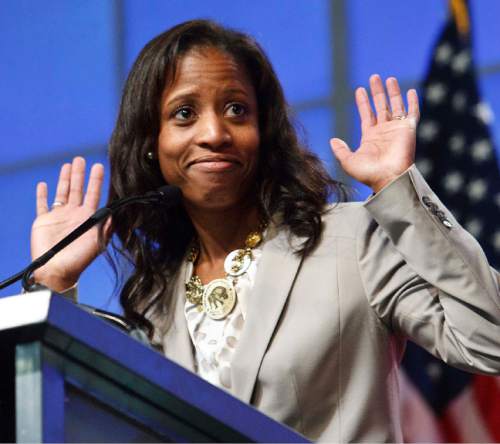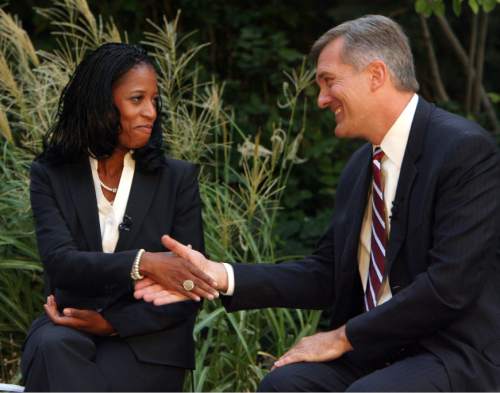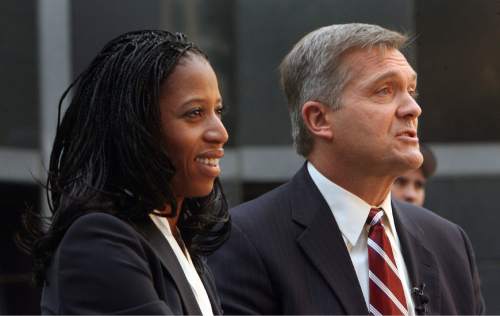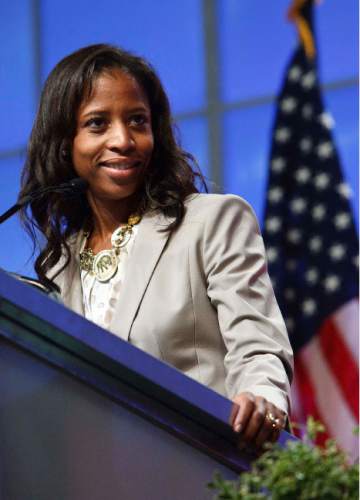This is an archived article that was published on sltrib.com in 2014, and information in the article may be outdated. It is provided only for personal research purposes and may not be reprinted.
Editor's Note • This is the sixth in a series of excerpts from "Mia Love: The Rise, Stumble and Resurgence of the Next GOP Star" by Tribune reporters Matt Canham, Robert Gehrke and Thomas Burr.
If Jim Matheson was surprised or scared that Mia Love won her party's nomination in 2012, he didn't show it. Nor would he acknowledge anything unique about his new Republican rival.
"I don't see the difference between her and everyone else I've run against," the Democrat said while campaigning at the Boy Scouts' Scout-O-Rama in the South Towne Expo Center where Love had clinched the nomination two weeks earlier.
"They're going to go back and walk the party line. They're not going to put Utah first, they're going to put the party first, and that's the difference in this race."
But the GOP saw this as a unique opportunity, with Matheson running in a new district, Mitt Romney expected to drive up turnout in Utah, and a candidate that excited moderate Mormons. Brock McCleary, deputy political director with the National Republican Congressional Committee, said Matheson had run into "an unfortunate set of circumstances that have come to bear in this one year."
The main strategy from the Love camp was tying Matheson closely to unpopular President Barack Obama, and it became evident in the first debate, which took place in late May.
"If you support that president, you support that agenda [of raising taxes and nationalizing education]," she told those gathered at the Utah Taxpayers Association event. "Do you believe that this is unreasonable: the concept that we don't want the federal government to educate our children, control our lands, regulate each business and provide health care by force?"
Matheson resisted, saying Love was just reciting talking points from the national Republican playbook. He fell back on his record, his long-honed image among Utah voters and the public respect for his father, the late Gov. Scott Matheson.
"You know me. You know how I've done this job. I was taught by my dad to work with anybody who approaches public policy in the interest" of doing good, he said. "I'm convinced we need men and women of good will who are prepared to roll up their sleeves and take on those issues."
Her campaign struggled to respond effectively to Matheson's accusations that she was a radical budget hawk wedded to tea-party ideology, and the public's perception — one that would endure until well after the campaign was over — began to solidify.
—
Friends in high places • In late June, Mia paid a visit to an important ally at the home of Josh Romney.
Mitt Romney's wife, Ann, was visiting her family in Salt Lake City and wanted to meet with Mia. It was a low-key meeting, with less discussion of policy and politics than children and family. "She was very lovely and pleasant, warm and personal, getting to know me personally," Mia said.
Soon afterward, Ann Romney publicly endorsed Mia — a significant move because, although Team Romney had backed her during her convention upset over Rep. Carl Wimmer, this time the support came directly from the candidate's spouse. And Ann Romney rarely did endorsements.
Support from the Romney family paid off in many ways including Josh Romney's advocacy for Mia as organizers of the 2012 Republican National Convention began putting together the list of possible speakers.
"I'd seen her in Salt Lake and I figured if she did half as good at the convention as she did in Salt Lake it will be a home run," said Romney.
The added bonus, of course, was that Mia would bring gender and racial diversity to a convention frequently knocked for being too white and too male.
For Mia's campaign, the publicity would be tremendous. With tens of millions of people watching the convention at home, it would bring instant credibility, offer her a national platform and tie her closely to the Romney camp.
But not everyone thought the speaking slot was a great idea. Inside the campaign, some questioned whether it would be better to stay home, and one pollster, whom the campaign didn't hire, warned her it would show Mia "being Hollywood."
—
Jockeying • When convention organizers sent over the speech they wanted Mia to deliver, it was a major disappointment. "Horrible," as one staffer put it.
"Anybody could have delivered that speech," he said. "They almost didn't have any thought of who was delivering the speech. They obviously chose Mia for a reason, but the speech didn't reflect any of that. Nothing about her story."
It was as if organizers just wanted a black female candidate to walk onstage as a symbol of diversity, wave and say, "Vote for Mitt."
It also clocked in at less than 90 seconds.
The campaign rejected the speech and offered its own suggestions for a 90-second talk that the convention organizers accepted.
But the Love campaign also wrote out a longer version, more tailored to Mia's backstory, that was 4½ minutes long.
On the Monday night before the convention, speakers were taken on a walk-through to get accustomed to standing on the stage in front of the massive television screens and looking out at the vast Tampa Bay Times Convention Center arena, the red-white-and-blue bunting and the 20,000 seats.
Backstage, there was a small crew, including a speech coach to give tips on delivery, a videographer, the writer of her original speech who was disgruntled his work had ended up in the trash can and a guy with a stopwatch.
They loaded up the 90-second speech and Mia read through it exactly as it was written. The coach gave her some tips and told her to go through it again.
The second time, Mia strayed from the prompter. She said it wasn't working right and plowed ahead, delivering the longer version.
The timer looked up from his stopwatch. "That's really, really good," he said. "If you don't let her use every damn word in that speech, you're a bunch of blankety-blank idiots."
Everyone was in agreement. She would get 4½ minutes.
—
Spotlight • The chorus of Queen's "We Will Rock You" with its familiar boom-boom-crash blared over the loudspeakers as Mia strode onstage, waving in a cream-colored skirt suit.
"Let me tell you about the America I know," she said, moving quickly into the story of her parents' emigration from Haiti.
"The America I know is grounded in the determination found in patriots and pioneers, in small businesses with big ideas. It's found in the farmers that work and the beauty of our landscapes and our heroic military."
"President Obama's version of America is a divided one, often pitting us against each other based on income level, gender and social status. His policies have failed us," she said, then thrusting her finger toward the ground to accentuate each syllable, she lit into the president. "We're not better off than we were four years ago and no rhetoric, bumper sticker or Hollywood campaign ad can change that."
The crowd erupted. A who's-who of the Republican Party assembled in the green room backstage stopped what they were doing. Governors and senators and the party chairman all turned to watch the televisions.
"Mr. President, I'm here to tell you: The American people are awake and we're not buying what you're selling in 2012," she said with a slight side-to-side head-bob to emphasize the defiance from the small-town mayor to the most powerful man in the world.
"The American Dream isn't just my story. It isn't just your story. It's our story. … This is our America. This is the America we know because we built it!"
Delegates leapt to their feet waving signs that said "We built it" and a chant of "U-S-A! U-S-A!" erupted, morphing into "We built it! We built it!" as Mia nodded in approval. "Yes we did," she said.
Jim Matheson, a man who loves the psychological warfare of a campaign, made sure local reporters followed him around on the day of Mia's big speech as he shook the hands of firefighters and held a news conference where he took a line from the infamous mailer and turned it into a torpedo.
At Salt Lake Community College, he displayed U.S. Department of Education statistics showing that nearly 300,000 Utah students would be affected if Congress eliminated federal student aid, as she had advocated in her earlier list of budget cuts. He went out of his way to use the state's name as many times as possible.
"She's in Florida getting ready to give a partisan speech," said Matheson, who has never attended a national party convention. "I'm here with Utah firefighters and talking to Utah students today. I'm more about Utah. You know me."
—
Seige • A tsunami of television ads flooded Utah airwaves in the late summer and fall of 2012. Matheson and Love were spending millions, and outside groups were paying even more.
By the end of October, spending by the candidates and groups had climbed past $10.5 million — split almost evenly between the two sides. More than $6 million went to television advertising, and the average viewer was apt to see a dozen spots every day for the week leading up to the election.
"If people thought we'd seen saturation, the voters in Utah don't know what saturation is," Matheson said. "They're going to find out."
The storylines of the ads were predictable: The candidates tried to make themselves appear warm and fuzzy, while the outside groups tried to land the haymakers.
Love's national advisers wanted to fire off more negative ads, but some local staffers disagreed. Campaign adviser Boyd Matheson challenged the strategy late in the campaign, noting Jim Matheson's reputation was well established in the state.
"You can spend $50 million trying to beat up Jim Matheson and his negatives will never go above 34.5 percent," Matheson argued.
Nevertheless, a new slate of Matheson hit pieces went forward.
Mia's internal polls showed her lead held at 15 into early October and, although they showed tightening into midmonth, she was still in the lead.
Independent polls had been all over the map for weeks. A Dan Jones & Associates poll in mid-September gave Love a 6-point cushion, and the most recent numbers showed her up by nearly 5 percent. An October poll by BYU showed the race tied at 43-43.
A pre-election poll by The Salt Lake Tribune reinforced the Love camp's confidence. It showed her up by a dozen points. The Tribune pollster, Mason-Dixon Polling & Research, chalked it up to Romney's draw.
The Matheson campaign went through the roof, disputing the accuracy of the Tribune poll before it ran and demanding the newspaper back away from the numbers. While the campaign was confident in its own polling showing a tight race, it feared the publicity over such dismal numbers would drive down turnout and affect the race.
National handicappers moved the race to "leans Republican," based on The Tribune's Mason-Dixon poll.
Drilling down into the numbers, it became clear the pollster had blown it.
Mason-Dixon had oversampled Republican voters in the more Democratic-leaning Salt Lake County, skewing the results.
Editors at the paper decided the polling numbers could no longer be trusted. On the Saturday before the election, the reporter covering the race notified the campaigns that the paper was taking the unprecedented step of publicly retracting the poll and publishing a story explaining the bad information.
—
Election Day • For Love senior adviser Ivan DuBois, the problem wasn't just the newspaper poll. Its numbers were consistent with the internal polls the campaign had been seeing from Public Opinion Strategies. If the Tribune's data were flawed, then Love's figures were probably off the mark, too. And, therefore the message was all wrong.
For DuBois, it was the worst moment of the entire campaign.
Public Opinion Strategies had also told the Romney campaign he was going to win Florida, had a shot at taking Pennsylvania, Ohio and Colorado, and could trounce Obama and win the White House by a huge margin.
It was a crisp, autumn morning when Election Day rolled around. The Love campaign felt generally positive about Mia's chances to be a congresswoman-elect by the end of the night.
Love adviser Steve Hunter couldn't quite put his finger on it, but from his perspective, there was something amiss.
"That whole day, it felt off. We knew it was off. It just felt weird," he said. "We knew she was going to lose. The day before we felt OK. But that day was just off."
It was obvious, even early in the evening, that Romney's chances were quickly being dashed apart, as one swing state after another — Ohio, Pennsylvania, even Florida — broke for Obama.
Utah Republicans took the loss hard, gazing in disbelief as the race was called for Obama shortly after 9 p.m. Mountain Time. With most Utah GOP candidates declared winners early on, that left Mia's race as the only real cliffhanger. At 11:40 p.m., with 88 percent of the votes counted, Matheson's lead stood at 721 votes and appeared to be dwindling. But by the end of the night, with all the election-night votes counted, Matheson clung to a 2,818-vote lead.
Mia's children and parents were in tears, but not Mia. She hugged Jason and smiled at those in the suite at the Hilton in downtown Salt Lake City.
"We gave it our best shot," she said, smiling. "I have no regrets. Thank you guys for being by my side. Let's go down there and congratulate my opponent."
During subsequent weeks, there would be a recount and jockeying over provisional and absentee ballots yet to be counted, but nobody believed the outcome would change. In the end, Matheson remained 768 votes ahead, a figure now seared into Mia's memory.
Next: The 2014 race begins almost before the dust settles on the last election. "Mia Love: The Rise, Stumble and Resurgence of the Next GOP Star"
The book produced by The Salt Lake Tribune is available at Salt Lake area local bookstores, including Weller Book Works, The King's English, Eborn Book and Frost's Books, and the Brigham Young University bookstore for $9.99. It is available as an e-book for $6.99 from Amazon, Barnes & Noble and iTunes. For more information, please visit MiaLoveBook.com.









